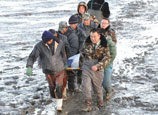
"Whether you tell your partner or other people is not the issue here, the most important thing is to always use protection for yourself and for others," said Xiong Weixiang, the head of Lanyu. His NGO screens and tests about 1,000 people a month, finding about 100 new cases among these.
During that first month, people are still coping with the fact that they have HIV and may not know how to tell their loved ones. Instead of providing them with sufficient care and consultation about how their life is going to be affected in the future, such policies treat carriers as if they are nothing but a threat, said Xiong.
Many people say that after testing positive, they are most concerned about how the situation might affect their family, friends and co-workers.
Zhao admits that a lack of knowledge about AIDS and how to protect against it has led to the spread of the disease.
"Like most people infected with HIV/AIDS, I went through denial, fear and anger before finally accepting the fact," said Zhao.
When he first found out, Zhao was concerned that he might incidentally transmit the disease to his co-workers, so he carried sanitizers and band-aids with him at all times. Zhao said even though his current boyfriend doesn't mind, he is always concerned and cautious.
"We want the disease to stop here and not affect more people," said Zhao.
Split in criminalization
In the Chinese legal system, it is a crime to intentionally spread sexual transmitted diseases through prostitution, but this does not apply in a marriage or an ordinary relationship.
Yang Shaogang, a Shanghai lawyer and advisor to the local government, is among those legal experts who propose legislation to make the intentional transmission of HIV/AIDS a crime, as it already is in many countries.
















 Memorial service held for China's fighter jet production head
Memorial service held for China's fighter jet production head


![]()
